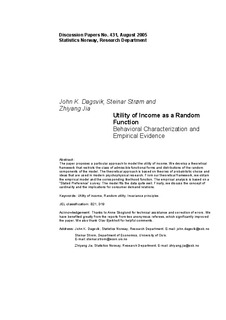| dc.contributor.author | Dagsvik, John K. | |
| dc.contributor.author | Strøm, Steinar | |
| dc.contributor.author | Jia, Zhiyang | |
| dc.date.accessioned | 2011-10-08T16:59:13Z | |
| dc.date.available | 2011-10-08T16:59:13Z | |
| dc.date.issued | 2005 | |
| dc.identifier.issn | 1892-753x | |
| dc.identifier.uri | http://hdl.handle.net/11250/180311 | |
| dc.description.abstract | Abstract:
The paper proposes a particular approach to model the utility of income. We develop a theoretical
framework that restricts the class of admissible functional forms and distributions of the random
components of the model. The theoretical approach is based on theories of probabilistic choice and
ideas that are used in modern psychophysical research. From our theoretical framework, we obtain
the empirical model and the corresponding likelihood function. The empirical analysis is based on a
“Stated Preference” survey. The model fits the data quite well. Finally, we discuss the concept of
cardinality and the implications for consumer demand relations.
Keywords: Utility of income, Random utility, Invariance principles | en_US |
| dc.language.iso | eng | en_US |
| dc.publisher | Statistics Norway | en_US |
| dc.relation.ispartofseries | Discussion Papers;No. 431 | |
| dc.subject | Utility of income | en_US |
| dc.subject | Random utility | en_US |
| dc.subject | Invariance principles | en_US |
| dc.subject | JEL classification: B21 | en_US |
| dc.subject | JEL classification: D19 | en_US |
| dc.title | Utility of income as a random function : behavioral characterization and empirical evidence | en_US |
| dc.type | Working paper | en_US |
| dc.source.pagenumber | 54 s. | en_US |
